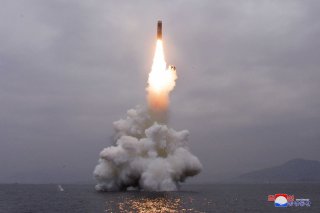Why Kim Jong-un Will Engage in a Show of Force Before 2020 Ends
He has two very good reasons.
It seems the reports of Kim Jong-un’s demise have been greatly exaggerated. This week National Security Adviser Robert O’Brien declared that Kim is “probably doing well” after vanishing from public view for much of last month. What next for North Korea now that the maximal leader has apparently resurfaced? The top priority will likely be the same regardless of whether Kim remains in good health or another ruler assumes control of the hermit kingdom after his demise: to remain in power. The dynasty will reaffirm its vise grip on power at home while deterring aggression abroad.
Shows of force serve both ends.
Counterinsurgency scholar Timothy Lomperis helps us fathom Kim’s domestic quandary. Lomperis depicts an insurgency as a contest for political legitimacy between an incumbent regime and an internal challenger that covets rule for itself. Pyongyang faces no insurgency as best we know, but we can apply Lomperis’s taxonomy of legitimacy to evaluate governing arrangements even when a regime is not under such extreme duress. Legitimacy, he says, comes in three layers. The bottom, most basic layer is “interest,” by which he means ordinary citizens’ ability to make a living in relative safety. Government and populace form a compact: the people accept the regime as legitimate so long as it provides competently for the public welfare.
Lomperis calls the middle layer “opportunity.” A ruling regime that craves more durable legitimacy makes the people stakeholders in its rule. It harnesses popular support by, say, holding elections, executing land reform, or allowing citizens to compete for government jobs on a nondiscriminatory basis. A regime entrenches itself by making the populace not just a passive recipient of physical and economic security but an active ally in perpetuating the incumbent’s rule. The topmost layer is “belief,” meaning that the governed believe the regime rules by right. People may excuse a certain amount of incompetence or malfeasance if they believe—whether for religious reasons, out of historical tradition, whatever—that their political masters are entitled to govern.
The Kim dynasty has a problem by Lomperis’s standard. It neither provides competently for the public welfare nor enlists the populace as a stakeholder in its rule. Few would say the dictatorship in Pyongyang commands interest or opportunity-level legitimacy. Which leaves belief. It verges on impossible for outsiders to gauge public sentiment within North Korea. This is true in particular on sensitive matters such as whether the populace regards the Kims as rightful rulers. Still, it is reasonable to conjecture that seventy-plus years of catastrophic governance—of utter failure in the interest and opportunity domains—has degraded whatever belief-level legitimacy the Kims once enjoyed. No amount of photos of Kim Jong-un riding his steed on a snow-covered mountain could resuscitate belief in his right to rule, once lost.
Bottom line: the Kim dynasty’s political legitimacy appears partial and infirm. That leaves force. A regime can rule so long as it maintains an imposing armory and convinces others it is prepared to use firepower to thwart domestic or foreign challenges to its standing. In all likelihood, then, this year will witness fresh displays of military power—both to cow the populace at home and to reinforce deterrence vis-à-vis external antagonists such as South Korea, Japan, and the United States. It could test nuclear weapons or intercontinental ballistic missiles, make mischief around the South Korean periphery ten years after the Cheonan sinking, and on and on. Pyongyang will make every effort to project the image of a virile, confident regime.
And if it can burnish its reputation in a manner that subverts archfoe Donald Trump’s bid for reelection, so much the better.
James Holmes is J. C. Wylie Chair of Maritime Strategy at the Naval War College and the author of A Brief Guide to Maritime Strategy. The views voiced here are his alone.
Image: Reuters

